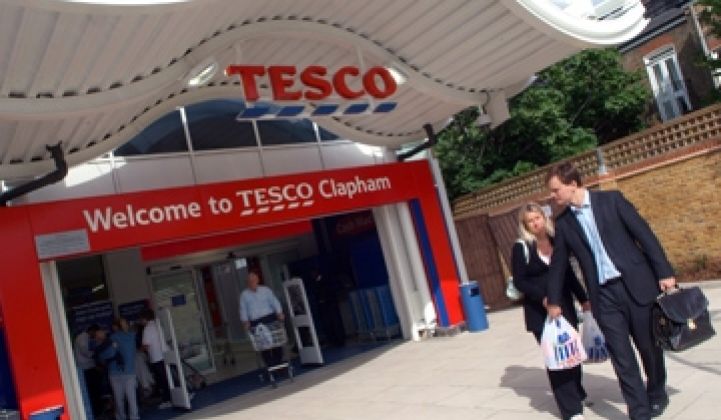CA is the latest enterprise software giant to jump into the carbon accounting software field, and it's landed the United Kingdom's version of Walmart as a showcase client.
That's Tesco, a supermarket chain with about 486,000 employees at some 4,000 locations in 14 countries.
CA (formerly known as Computer Associates) announced Tuesday that Tesco will use its ecoSoftware suite to help find out how much carbon those widespread operations are emitting, and find cost-effective ways to meet the company's goal to cut it in half from its 2006 levels by 2020.
CA is among the enterprise giants – IBM, Microsoft and SAP among them – getting into the carbon accounting space. Then there are startups including Hara, CarbonFlow, Planet Metrics and CSRWare that have been raising increasing amounts of VC cash to get into the market (see stories here, here and here).
While that market is now worth a relatively tiny $10 million or so in the United States, that's set to double annually as companies look to better track, report and contain carbon emissions, according to a June report from Greentech Media and Groom Energy Solutions (see Carbon Accounting: It's All About Appearances).
Most companies today use spreadsheets to keep track of their carbon emissions. But the complications of meeting emissions reporting guidelines – whether to meet government regulations or as part of corporate energy efficiency or public relations efforts – should boost the move to software as a management tool (see Obstacle to Cutting Emissions: Filling Out Surveys).
As for Tesco, it's looking to CA initially to "being able to track all the different sources of emissions, track the energy, track the carbon associated with that for their carbon footprint," said Terrence Clark, senior vice president of CA's ecoSoftware group.
In the future, the chain may consider using ecoSoftware for broader management of energy use and environmental sustainability goals, he said.
That could expand to calculating suppliers' carbon footprints, he added. It's something Walmart and Microsoft have asked their suppliers to do (see Green Light post).
Tesco's a pretty noteworthy first client, indicating that CA's new product probably shaped up well against those from competitors, said Paul Baier, Groom Energy's vice president of consulting.
It's also a sign that corporate investment in carbon accounting software, which slowed down in the first half of 2009 amidst the global recession, may be picking up, he noted.
There's a lot of room for competition, he added. Among Groom Energy and Greentech Media's list of the top ten market share holders for carbon accounting software, only one startup was included – and that startup, Clear Standards, was acquired by SAP in May (see Carbon Consolidation Begins With SAP's Latest Buy).
Industrial conglomerate Johnson Controls, also on the top-ten list, got there with help from its 2008 acquisition of Global WorkPlace. Other top-ten leaders include Germany's PE International, and environmental, health and safety companies Enviance, ESS, IHS, and ProcessMAP, the report found.
It's likely that the IT giants will increasingly make their mark in carbon accounting, Baier said. One example may be last week's announcement that Microsoft, SAP and Accenture would team up with leading corporate climate change tracking group Carbon Disclosure Project to create a "de-facto" platform for the companies that report to it.
Groups like CDP, Ceres, Trucost and others that represent investors with an interest in environmental and social responsibility issues are driving a great deal of today's activity on corporate carbon emissions reporting.
But there are also government regulations, both existing and expected to come, to prepare for.
Europe has had a cap-and-trade system in place since 2005, though its implementation has been fraught with problems (see the New York Times' Green Inc. blog for a recent example).
The U.S. is considering carbon cap-and-trade legislation as part of the American Clean Energy and Security Act, although recent developments in Congress indicate it might not be completed this year (see Green Light post and House Energy Bill Draft: Cap-and-Trade Included).
As for the U.K., it has proposed the Carbon Reduction Commitment, due to take effect next year, which would regulate industry sectors outside of utilities and other large-scale emitters like, say, supermarket chains.
Image via Tesco PLC.



